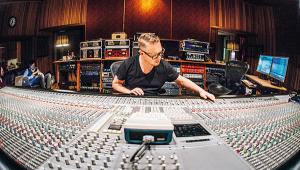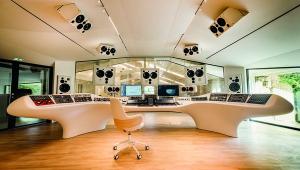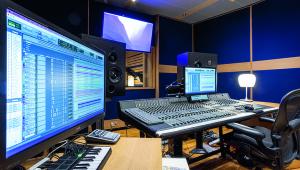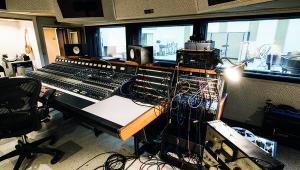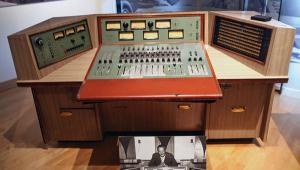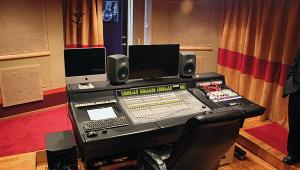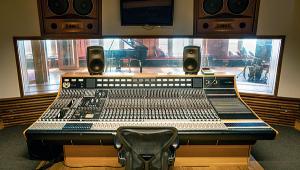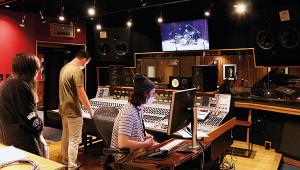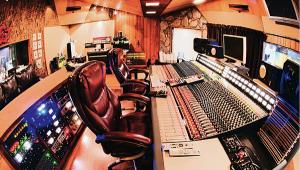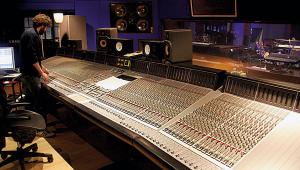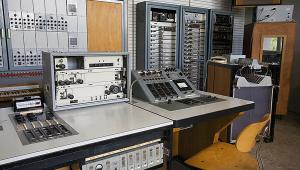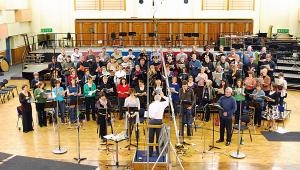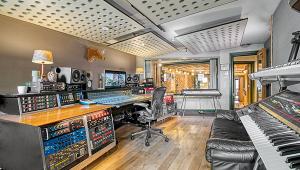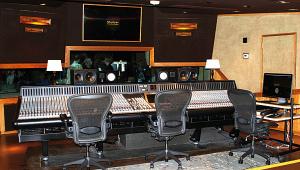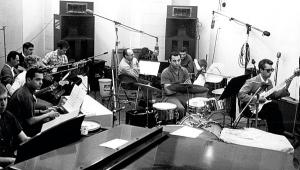Highbury Studio

You may have read recently about Coldplay's magnificent gesture of donating 10% of the profits from their forthcoming UK tour to the Music Venues Trust to help small gigs keep going under crushing financial burdens. Well, on something of a smaller scale but still splendidly heartfelt, back in 2015 a bunch of local Birmingham artists got together to donate tracks to a double album, the proceeds of which were to help raise £250,000 to secure the future of a studio they'd all benefited from working in during their formative years.

The album was called Four Sides Of Highbury – named after the studio. Available via the Pledge Music website, it featured tracks from The Alternative Dubstep Orchestra, Big Tent And The Gypsy Lantern, Boat To Row, Goodnight Lenin, Hannah Molloy, Little Comets, Misty's Big Adventure, Namiwa Jazz, Rhino And The Ranters, Roland Gift, The Bonfire Radicals and The Old Dance School, and was recorded on the premises on a one-inch tape system with no digital interface.
Playback perks
OK, so Roland Gift, singer with Fine Young Cannibals, might be the only name familiar a decade on, but there were other initiatives also offered to those generous enough to participate. Supporters of the project could also benefit from a variety of exclusive experiences including buying rehearsal or recording time, accessing mentoring from industry experts and joining in bespoke musical private parties celebrating the history of the building, which included the unique opportunity to listen to extremely exclusive original demo tapes of artists who'd recorded there.
The biggest pull was Duran Duran, who demo'd 'The Chauffeur' and 'Save A Prayer' at Highbury for their eponymous debut LP, and also for 'Rio'. Plus, you could listen to the demo of the 1985 hit single 'Kiss Me' by Stephen 'Tin Tin' Duffy, a member of an early Duranie incarnation. Organisers said the tapes had never left the studio – 'and never will… so this is the one chance to hear them in the very place that they were recorded'.
From the ground up
A session lasting two hours with refreshments for up to six people was advertised at £300. 'Looking forward to the next 35 years', said the studio's press release. 'We want to improve the sustainability of this old studio, so that it can be a place where the next generation of great writers, singers and musicians find inspiration to record and rehearse.
'By pledging to buy a copy [of Four Sides Of Highbury], supporters will be investing in Birmingham's musical past whilst helping to secure a part of its future'.

The story of Highbury Studio begins in the small ground-floor flat of a house in Cambridge Road, Moseley. The place was home to Bob Lamb who was pretty well known in Brummie musical circles as the drummer for local pub rock celebrities The Steve Gibbons Band. A few youths from the area had started a band and, not knowing how to go about getting any recording done, approached Lamb to see if he could help them out.
That band was UB40 and this is how Lamb remembers it: '"King" was the first song they played to me, and it just blew my mind to realise a bunch of kids could make a sound like that... And that was it for me, I was hooked, it was a bit like Elvis walks in or something, you know, it was one of those moments'.

With no money available to hire a studio, Lamb set them up in his flat. One of the band, saxophonist Brian Travers, recalls: 'He had his bed on stilts and underneath the bed was a sofa and mixing desk. So, we recorded the album there on an eight-track machine, with the same 50p coin going through the electric meter continually because we'd booted the lock off it.
'And with it being a bedsit and us being eight in the band', he continued, 'we'd record the sax in the kitchen – because there was a bit of resonance off the walls, a bit of reverb – before putting the machine effects on it. While the percussion – the tambourines, congas and drums – we'd do in the back yard. Which is why you can hear birds singing on some of the tracks! You know, because it was in the daytime we'd be shouting across the fences "Keep it down! We're recording!"'.
Chart kings
The LP – called Signing Off – was recorded in three separate sessions: four days in December 1979 and two longer sessions in March-April 1980 and June-July 1980. Upon release the album went to No 2 in the charts, the group's debut single, 'King', got to No 4 and UB40 were on their way to becoming household names.
Lamb was bitten by the production bug and, with the neighbours complaining about the noise, in 1980 used his share of the money from the album to buy a small property at 122a Highbury Road in nearby Kings Heath.
From bats to tracks
It was nothing fancy – no Abbey Road that's for sure – just a kind of extension on the end of a terraced house that was once a barn, then a factory for making cricket bats. But it served its new purpose well in providing a place where local up-and-coming artists could rehearse and lay down tracks on the cheap.
'Highbury is an analogue recording studio, the only single rehearsal room in Birmingham', is how the studio marketed itself. 'With only one room there's no sound leakage from next door. We are all yours with nothing and no one to distract you.'
We've mentioned some of those artists already. Alongside Duran Duran, it was at the studio that Ocean Colour Scene demo'd their breakthrough eponymously-titled debut LP in 1991, including the singles 'Sway' and 'Yesterday Today'. Lamb oversaw this little lot and more until he bailed in 2010, passing the baton to a mover and shaker called John Mostyn whose resume reads like a who's who and what's what when it comes to the Birmingham scene. Among his many accomplishments, he managed The Beat and their later spin-off the Fine Young Cannibals, guided electronic music group Inner City to their hits 'Big Fun' and 'Good Life', and launched Ocean Colour Scene via his own Phffft label.
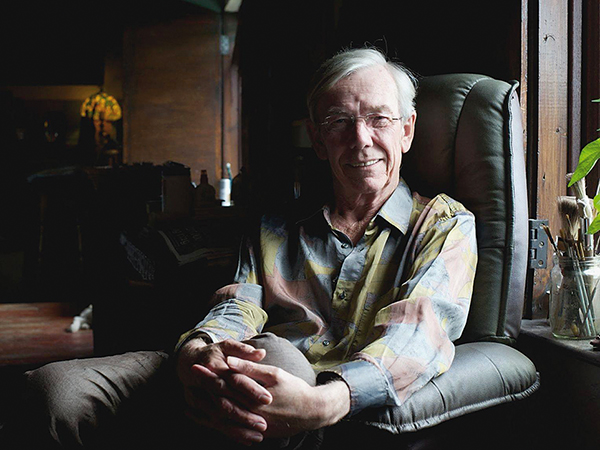
Mostyn was also involved in getting Coventry's 2-Tone Records going when Jerry Dammers of the nascent Specials brought him a copy of 'Gangsters', the band's first single, seeking advice about how to sell it and worried that he'd be saddled with loads of unsold copies of its initial pressing of 1000 units. Mostyn booked the band on a national tour and, seeing the ecstatic crowd reaction, Chrysalis Records picked up the group as well as their label.
Mostyn also managed The Chameleons in the early 1980s, funded the first recording by The Wonder Stuff and managed Alison Moyet for a while.
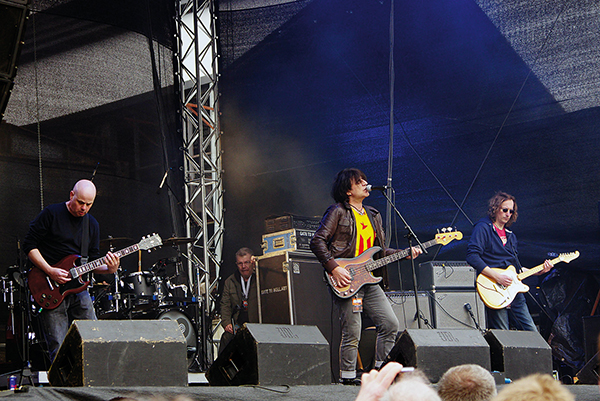
The Chameleons on stage in 2013 at the Rock in den Ruinen festival
Turnover trials
It was Mostyn who was behind the Four Sides… LP initiative but unfortunately, despite his very best efforts, the facility was forced to close in 2016. 'So it is farewell to Highbury Studio', he explained at the time. 'Up until last Friday we were still in with a good chance of restarting the studio with the help of some serious financiers but we were dealing with several key issues.
'The biggest was that in order to purchase the building and carry out the major improvements necessary we were looking at having to increase our monthly turnover by 100%. In a contracting market for recording this was ridiculously challenging. Increasing turnover by 100% was bad enough, but as the results of the [EU membership] referendum came in on Friday morning it was clear that every musician in the UK is likely to be worse off in the near and long term.
'Income from sales will fall and income from those profitable shows in Europe could now well be eaten up by the extra cost of visas, carnets, etc. So, we've called it a day. I'm sorry for us and our past and future customers who won't know what they missed.'
Singin' in the rain
A year later, activity on the site was resurrected by a local businessman called Chris Poole who owned Shades Music, an instrument repair and tuition centre on Moseley's Alcester Road. He renamed the facility Rain Studios and pumped in £40,000 to refurbish the place, get recording and rehearsal bookings going and set up School Of Rock weekend sessions for youngsters.
'It was incredible to open those doors for the first time', he told the press. 'It was like going back in time. To think that some of the greatest pop bands in Birmingham's history started out here was just unbelievable. We have discovered some memorabilia here that has just blown us away. When all our work's finished, there will be four rooms for bands to rehearse in.'
Sadly the venture didn't work out and Rain Studios closed in 2018.
Key Recording Timeline1980
UB40 record what will be their hit single ‘King’ in Bob Lamb’s ground-floor flat in Mosley
1980Duran Duran use Highbury to lay down demos of ‘Save A Prayer’ and ‘The Chauffeur’ onto eight-track
1980Duran Duran use Highbury to lay down demos of ‘Save A Prayer’ and ‘The Chauffeur’ onto eight-track
1986John Mostyn provides finance for The Wonder Stuff’s debut EP, A Wonderful Day, which kickstarts their career
1988Mostyn discovers the Detroit-based music group Inner City. Their single ‘Good Life’ is a worldwide chart hit
1989While managed by Mostyn, Fine Young Cannibals enjoy a No 1 hit in the US with The Raw & The Cooked
1990Ocean Colour Scene use Highbury to demo their self-titled debut album featuring the Top 10 single ‘Sway’
